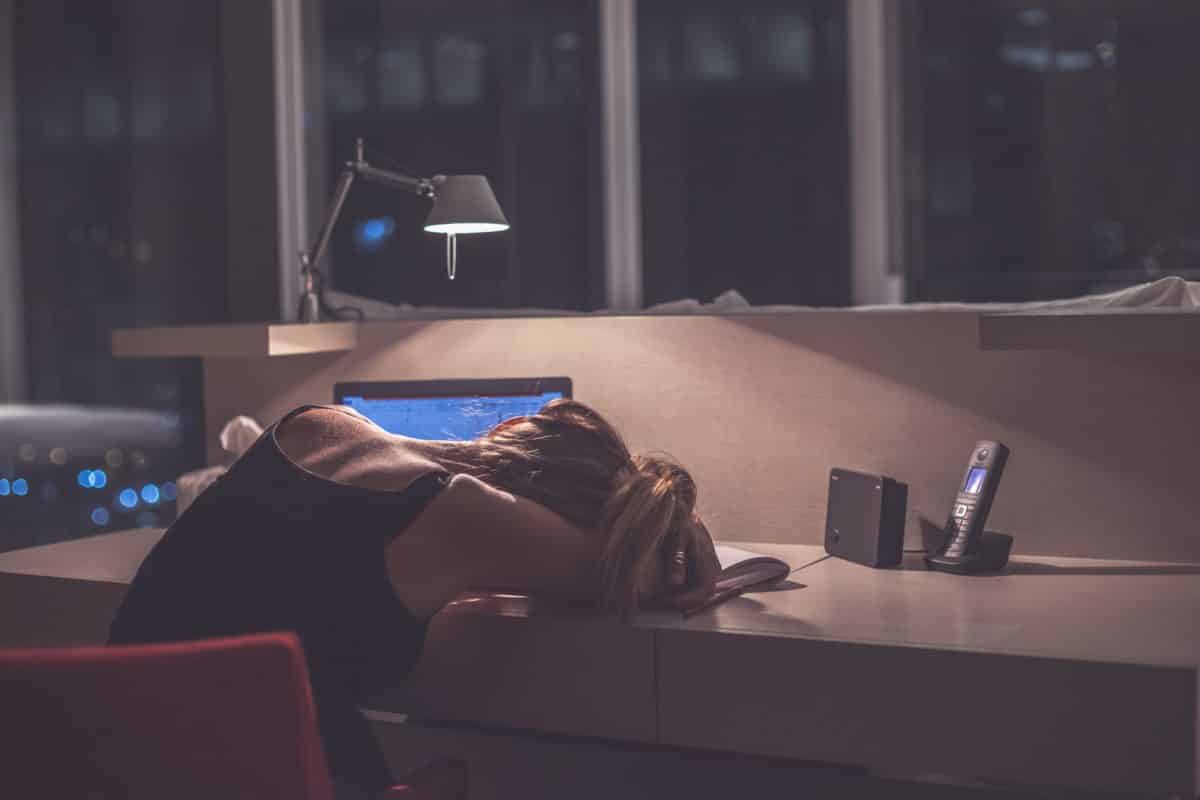Has the work-from-home trend been replaced by the sleep-at-work trend? Workers across the globe are getting their zzzs from factories and office spaces, skipping the commute to clock more time at work.
But more time at the office doesn’t necessarily mean more productivity. And for some, trading in their beds and nightly routines may be downright harmful to their health.
If you’re considering turning your workspace into your sleep space, find out if the sleep-at-work trend is a productivity hack or a hazard to your health.

The Rise of Sleep Pods at Work and Sleeping in the Office
Twitter’s San Francisco headquarters reportedly converted several rooms into sleeping spaces right after a viral image of an employee sleeping on the floor to meet a deadline made its rounds across the internet.
The tech giant isn’t the first company to install sleeping spaces for hardworking employees. Mercedes-Benz, Google, Nike, and Zappos are among the businesses that have introduced nap pods to their workplaces.
Tech workers in China have been blurring the lines between work and home for years, sleeping in office bunk beds and on camping cots next to their desks as a way to skip the commute and work overtime in a highly competitive industry.
While the sleep-at-work phenomenon appears to be a hallmark of the tech industry, it’s also been embraced by factory workers in China who needed to keep production lines moving, particularly when COVID lockdowns hit.
Some of the sleepiest workers in the United States work in the best places to live. For these workers, an influx of people moving to their area means longer commute times, earlier rising times, and stiff competition for jobs.
Pros and Cons of Sleeping at Work
Are there benefits to sleeping at work? From utilizing a nap pod for a midday pick-me-up to sleeping (and living) entirely out of the office, sleeping at work has its share of benefits and potential pitfalls.
Pros
Lowering Home Utility Bills
When Alistair Vigier started his own business, he crunched the numbers and decided that sleeping in his office space would free up some substantial cash for his start-up and reinvest the money he would otherwise spend on rent back into his company. Vigier calculated that investing the equivalent of rent, $2,500 a month, into ads for his firm could yield up to $60,000 in additional revenue for his business.
Even if you’re not planning on living full-time at your office, like Vigier, sleeping in the office a few evenings a week could help you reduce your utility bills at home. Less time at home means using less water and electricity.
More hours working could also mean you could save money on subscription entertainment services such as Netflix and Hulu, as well. Who needs to binge the latest series anyway if you’re putting in more hours at the office?
Eliminating Commute Times
The tech industry is known for high-paying positions located in even higher-priced locations. Many workers choose to live a bit further away from their work to save money. But longer commutes have been correlated with decreased job satisfaction; one study revealed that workers would rather clean their toilets than commute to work.
Workers who choose to sleep at the office often cite skipping the commute as a primary deciding factor.
In major cities like Chicago and New York, workers spend an average of four days each year commuting to work. Skipping the commute by sleeping in the office could give you back 100+ hours each year in increased productivity.
Increasing Work Productivity and Performance
How productive could you be if you spent four more days at work than your colleagues? In a highly competitive industry like the tech industry, it could mean getting a highly coveted position or promotion.
By skipping the commute and using that time to catch up on your sleep, you may also get the chance to perform even better. Studies have shown that losing even 16 minutes of sleep can affect your ability to do your job.

Cons
Abandoning Work-Life Balance
Sleeping in the office may allow you to skip the commute and save on some utility bills, but it doesn’t do much for work-life balance. And finding a good balance between work and life could be critical for your health and well-being.
Researchers from UCLA found that working longer hours correlated with an increased risk of death from stroke and heart disease.
Working longer hours has also been linked to increased stress and depression.
While it may give you a competitive advantage at the office to stay later than your coworkers and burn the midnight oil, forgoing work-life balance could have a negative impact on your physical and mental well-being.
Reducing Social Life Capacity
If long hours at the office are taking their toll, spending some quality time with friends and loved ones could be the antidote. A large body of research suggests that social relationships are critical for health and even longevity.
When you move into the office and forgo social activities in lieu of longer work days, you’re limiting your social circle and cutting down on the opportunity to go out and connect with friends.
Frequent Inconveniences
When Alistair Vigier experimented with sleeping and living out of his office, he found that his sleep was often disturbed by clients ringing the office at 4:00 am and fellow co-workers showing up to start their days early. If that wasn’t inconvenient enough, Vigier also had to figure out where exactly he would shower each day.
He ended up spending a substantial amount of money on a membership at a nearby health club where he could get in a quick workout and a shower so he could get ready for work each day.
Even if your office is set up with bunk beds, sleeping cots, or napping pods, it doesn’t guarantee you won’t get disturbed while sleeping or even have a place to bathe and brush your teeth.
Poor Sleep Hygiene
Getting enough good quality sleep each night is crucial for optimizing mental and physical health and performance. For many people, that means paying special attention to sleep hygiene, the healthy habits that can help you fall and stay asleep.
Good sleep hygiene often includes habits such as a consistent bedtime, sleeping in a room that’s cool and dark, avoiding blue light from computer screens and phones two hours before bed, and avoiding working from your bedroom.
Sleeping at the office can make it extremely difficult to create good sleep hygiene habits, particularly if you can’t get an environment that is dark and quiet enough for uninterrupted sleep.

How to Sleep at Work
Even if you don’t want to sleep at work, there could be times when it is unavoidable. Like the Twitter employee who curled up on the floor with a sleeping bag and sleeping mask to meet a tight deadline, you may find yourself wondering how to sleep at work at least once in your career.
If you do have to pull an overnighter and get some sleep at the office, try to keep comfort and sleep hygiene in mind. Look for a couch or cot that will allow you to sleep comfortably. The last thing you want is to wake up with a sore neck or back after a night on a beanbag. Try your best to find a dark and quiet place to sleep, even if that means donning a sleeping mask to block out harsh overhead fluorescent lighting. Avoid blue light from your phone or laptop prior to going to sleep, but you may want to use your phone to play some pink noise or binaural beats to help you drift off to sleep.
If you’re looking for a place to take a quick nap during the day, many of the same rules apply. Adults need seven or more hours of sleep each night, and if you’re not getting the recommended amount, a nap could help you play catch up and avoid unfortunate accidents or negative job performance resulting from inadequate sleep. The best way to nap to avoid grogginess includes keeping it short, lying down, and taking your nap around mid-afternoon.
Lastly, be sure your boss is ok with sleeping in the office. While some companies encourage it, others may be less welcoming of the idea of you curled up under your desk catching zzzs while clients are in sight. It may be better to sneak out for a quick nap in your car if the company culture has yet to embrace sleeping at work.
Final Thoughts: Is Sleeping in the Office Healthy?
While sleeping in the office may be a way to skip the commute and get ahead by putting in more hours than others, it may not be the healthiest sleep habit to adopt. Sleeping in the office makes it harder to practice good sleep hygiene, the habits that help you sleep well. Plus, the long hours and limits to your social life could have detrimental effects on your physical and mental health. While you may be required to sleep in the office every once in a while, the healthiest way to get a good night’s sleep is to head home and settle in for a night in your own bed.

